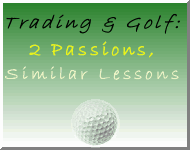 All Entries in the "Trading Psychology" Category
All Entries in the "Trading Psychology" Category
Great Equipment Won’t Make You Great
June 21, 2006 at 9:07 am
Every year in the golf world, newer and better equipment is revealed to make the game easier to play. Sweet spots get bigger, clubs get lighter, the ball goes farther. The problem is that the equipment only improves the results of the player incrementally – it doesn’t give them a great skill. That part they have to “dig out of the ground”, as Ben Hogan said. Trading is similar in that each year, new software and faster PC’s are produced which have the allure of quick and easy profits to the trader willing to purchase them. The fact is, traders are still limited to their own skill levels regardless of if they have the fastest computer or internet connection or trading platform. A 20-handicap golfer will probably only be able to hit that one perfect drive about once a round, so spending $400 on the newest oversize driver to replace last year’s model won’t show him the improvement he’s looking for. He’s far better off spending that same money on something that will improve his process, like taking some lessons or paying for range balls to hit while he tries to groove his swing better. Once he’s able to play more consistently, he’ll be far more capable of seeing a difference with better equipment. Traders can relate to this and avoid paying up for products with every possible bell and whistle available if they lack the discipline to trade consistently to begin with. Upgrade your method first, your equipment later. Odds are it isn’t the equipment causing you trading trouble.
Jeff White
President, The Stock Bandit, Inc.
www.TheStockBandit.com
[tags]Golf, Golf Equipment, Ben Hogan, Trading Psychology[/tags]
By the way, subscribing to this RSS feed will mean you won’t ever miss a post!
Miss ’em Close!
June 20, 2006 at 4:40 pm
In golf, it’s not how good your hits are but rather how well you miss it. Leaving yourself in position to play the next shot is crucial on every hole, and taking chances you can’t afford to take can ruin your score (and bruise your ego!). Trading is so similar, because although we’re going to be right at times, we’ll all be wrong plenty. Successful trading is only partially about your winning trades (hits), but don’t underestimate the power of missing it big. Making a run at that 20-foot par putt after struggling to make the green can easily leave you walking away with double-bogey, compounding an already poor effort. Risking it all for just a little glory or doubling down when you’re wrong in a trade can quickly put you right out of the trading biz!
Instead, why not do your best to minimize pain? Let those losing trades hit your predetermined stop loss, just as you would punch out of the trees to get back to the fairway. Playing for bogey hurts a little, but it won’t kill you. So, accept at the beginning of the day that you might be wrong on some trades. Take your medicine when you deserve it, and live to play (trade) again!
Jeff White
President, The Stock Bandit, Inc.
www.TheStockBandit.com
[tags]Golf, Trading, Trading Psychology, Trading Tips[/tags]
By the way, subscribing to this RSS feed will mean you won’t ever miss a post!
Grind it Out
June 20, 2006 at 9:25 am
Spending every day at the golf course might have meant lots of long, hot hours in the sun, but it didn’t mean that I had my best game every time I showed up. Some days I just didn’t have it, and there are days like that in trading too. In high school and college, we used to have to qualify for every tournament. If I wanted to make the traveling team (top 5), I’d have to earn it. We would play anywhere from 1 to 6 rounds to determine who would get to travel and who would get left at home, and I can certainly say that I didn’t have my “A-game” every time. Some days I just had to stick to what was working even if it meant I attempted fewer kinds of shots. If the low pull-fade was the shot that was working and a high draw wasn’t in my repertoire, then I played for the low fade! It kept me in the game and made me a tougher competitor as a result.
Trading is similar in that certain plays won’t work sometimes. Breakouts don’t work well in choppy markets, so you have to turn to reversals to make your money. Your bread-and-butter play might not be there for you under certain market conditions, so grind it out by finding another way to profit. Adaptation is the key!
By the way, subscribing to this RSS feed will mean you won’t ever miss a post!
Jeff White
President, The Stock Bandit, Inc.
www.TheStockBandit.com
[tags]Golf, Trading, Trading Psychology[/tags]
Always Room to Improve
June 19, 2006 at 9:35 am
There is a fine line between being picky and wanting to improve. If you shoot 7-under or make $20k trading on any given day, then obviously there’s not a lot to improve on. But, both trading and golf offer plenty of chances at the end of the day to find ways you could have done better. You could have made that 4-footer on the 8th hole and shot a lower score, and you could have sold your position at the absolute high of the day too. The improvement I’m referring to isn’t of that nature, because rarely (if ever) will we be perfect. Instead, strive to continually improve yourself. If your long game is good, work on your short game and putting. If you’re trading well, double-check your position sizing or expectancy. If you want to be great, expect to pay for it with your time and effort. Bottom line: trading and golf can both be high-maintenance endeavors, so be willing to put in the work to get to the next level.
By the way, subscribing to this RSS feed will mean you won’t ever miss a post!
Jeff White
President, The Stock Bandit, Inc.
www.TheStockBandit.com
[tags]Golf, Trading Psychology, Position Sizing, Expectancy[/tags]
Embrace Your Own Style
June 18, 2006 at 10:40 am
Golf swings are kind of like fingerprints – everyone has their very own. Although there are some strengths that other traders or golfers have which you’ll want to add to your approach, trying too hard to emulate someone else’s style will often have a negative effect on your performance. Watching the US Open golf tournament on television will show you plenty of great players with diverse styles. Taking note of someone else’s technique can help to improve your own, but remember to just blend that into your own style. Don’t try to be someone else. Every golfer and every trader has a different rhythm, so no two are exactly the same. Although you may make some adjustments to your approach along the way, embrace your own style and stay true to it.
By the way, subscribing to this RSS feed will mean you won’t ever miss a post!
Jeff White
President, The Stock Bandit, Inc.
www.TheStockBandit.com
[tags]Golf, US Open, Trading, Trading Psychology[/tags]
Practicing is Different Than Playing
June 17, 2006 at 9:50 am
Spending 1000 hours on the driving range won’t necessarily mean you’ll be a good golfer. After all, you have to be able to take your game from the range to the course! Although practicing is a requirement, you’ve got to get out there and play the game in order to really improve. Trading is similar when it comes to backtesting or trading on demo mode. I’ve mentioned before how I feel about trading on demo mode, and I would definitely relate that to practice in golf. Lots of beginning traders will attempt to “make money” on demo mode and expect to be able to take their method into the market with real dollars and achieve the same results, but it doesn’t work that way. Similarly, it would be unrealistic to hit a bucket of range balls well and expect to go shoot under par on the course without having played many rounds of golf. Although there is such a thing as beginner’s luck in trading, the odds of lasting success coming from demo mode into live trading just aren’t very high. You’ve got to trade with real money before you fight the real battle in the market: your emotions. Ranger Rick isn’t necessarily a great golfer, and Demo Mode Dan isn’t necessarily a great trader. Take your game to the course and then see how good you are.
By the way, subscribing to this RSS feed will mean you won’t ever miss a post!
Jeff White
President, The Stock Bandit, Inc.
www.TheStockBandit.com
[tags]Golf, Trading, Demo Trading, Trading Psychology[/tags]
Goals Are a Must
June 16, 2006 at 9:35 am
I tried out for the golf team in 8th grade and missed it, so I wrote it out as a goal for the following year, and I made it. My senior year as a collegiate golfer, I had a written goal of making First Team All-America, and I made it. I wasn’t sure what my competition would do, but I did know that setting my sights on a goal would require me to raise my standards and work hard in certain areas in order to elevate my game. I’ve discussed the importance of goals before, and I will always believe that having goals will produce superior results. Trading is the same way, and knowing what you want to achieve will help you determine how to get there. It’s tough to set a daily goal for yourself simply because there’s no telling what the market might bring. Late in the day if you’ve seen few opportunities, you’ll have a tendency to force trades which could lead to frustrating and unnecessary losses. When it comes to setting a goal for the week, month, or year, I am all for it.
Just remember that goals are different than expectations!
By the way, subscribing to this RSS feed will mean you won’t ever miss a post!
Jeff White
President, The Stock Bandit, Inc.
www.TheStockBandit.com
[tags]Golf, Trading, Trading Psychology[/tags]






